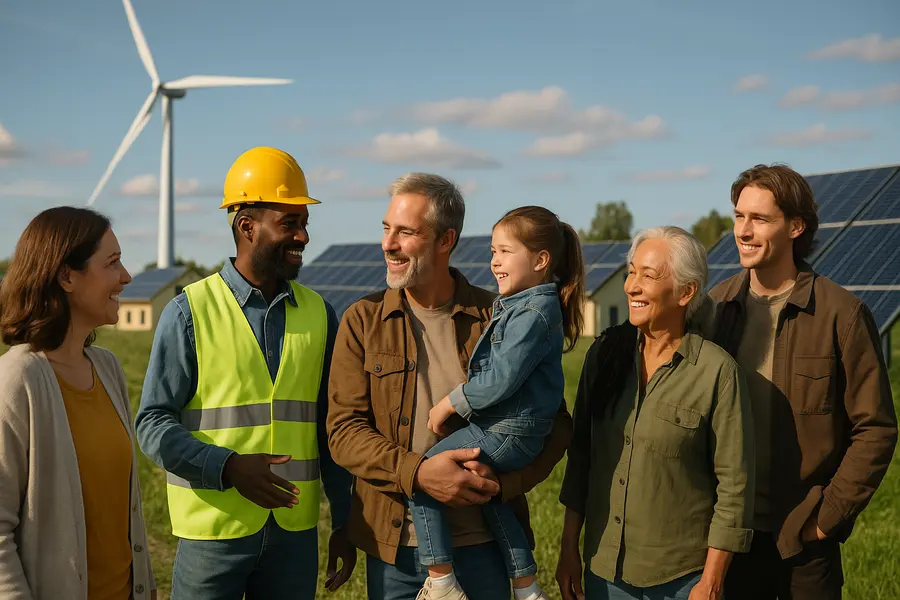Renewable Energy Adoption and Its Social Impacts: A Sociological Study
Are you curious about how renewable energy adoption is reshaping our communities and everyday lives?
Renewable energy adoption affects jobs, health, and communities. It creates cleaner environments, new opportunities, and fairer systems. Understanding these social impacts helps build a more inclusive and sustainable future.
In this article, we will understand the social impacts of renewable energy adoption. We will unpack key concepts like energy transition, social inclusion, and sustainable development. And illustrate how policies, cultural beliefs, and grassroots movements intersect to drive change.
Whether you’re an academic, policymaker, or concerned citizen, this article will illuminate the human side of our clean-energy revolution and highlight pathways to a fair and resilient energy future.

Introduction: Understanding Renewable Energy and Society
Renewable energy—derived from solar, wind, hydro, biomass and geothermal sources—now accounts for over 30% of global electricity production, up from 26% in 2020, thanks to record investments and technology improvements.
Yet despite the 2023 UN pledge at COP28 to triple capacity by 2030, only 22 countries have raised their targets, leaving global commitments at just 7.4 TW versus the 11 TW needed to hold warming to 1.5 °C.
These figures reveal not only a technical shift but a profound social transformation: communities worldwide face changing work patterns, new governance models, and evolving cultural attitudes toward energy.
A sociological approach unpacks how renewable adoption reshapes identities, social equity, and collective values.
If we map statistical trends alongside lived experiences, we can better understand who benefits—and who may be left behind—during this rapid transition.
Let’s dive into the social impacts of green energy—from rooftop solar panels and wind farms to community-owned microgrids.
Explore why public acceptance, environmental justice, and economic equity matter as much as technology breakthroughs.
Also, discover how renewable energy adoption sparks new job opportunities, transforms consumer behavior, and challenges traditional power structures.
The Rise of Renewable Energy Adoption: Trends and Technologies
Renewable energy adoption is rising due to climate urgency, technological advances, and supportive policies. This shift transforms energy systems, promoting sustainability and reducing carbon emissions globally.
Global renewable capacity grew by 8% in 2023, reaching 4.7 TW of solar and 1.4 TW of wind power, driven by sharply falling module costs and improved grid integration.
Investment surged to a record USD 622.5 billion in 2023—up 6% year-on-year—yet remains below the USD 1.3 trillion needed annually through 2030 to meet climate targets.
Breakthroughs in perovskite solar cells, long-duration battery storage, and floating offshore wind are widening deployment options across geographies and scales.
in Europe and parts of Asia now mandate 50–60% clean power by 2035, incentivizing smart grids and sector coupling.
This technological expansion is altering energy supply chains, labor markets, and regulatory frameworks, making the study of social dynamics—how communities accept, adapt to, and govern these systems—more urgent than ever.
Community Acceptance of Renewable Energy: A Social Perspective
Community acceptance hinges on trust, transparency, and local involvement in renewable energy projects.
Public support for renewables remains high but nuanced. A 2023 Pew survey finds 67% of Americans prioritize wind, solar, and hydrogen over fossil fuels, though 32% favor expanding oil and gas exploration.
In Australia, a CSIRO survey of 6,700 residents showed 60% oppose higher energy costs to accelerate the transition, while only 54% acknowledge human-driven climate change—highlighting economic and cultural barriers to local projects.
Urban populations often welcome rooftop solar, but rural communities express NIMBY-style concerns over land use, noise, and landscape change.
Cultural beliefs around land stewardship, historical distrust of government, and environmental awareness all shape acceptance.
A sociological lens reveals that meaningful engagement—early consultation, benefit-sharing schemes, and local ownership—can bridge perception gaps, turning potential resistance into active support.
Social engagement fosters shared ownership, reducing resistance and enhancing long-term sustainability.
Economic Impacts of Renewable Energy Adoption on Local Communities
Renewable energy has become a powerhouse for job creation: global employment in the sector rose from 13.7 million in 2022 to 16.2 million in 2023—the fastest annual growth on record.
Solar photovoltaic manufacturing and installation now employ 4.5 million workers worldwide, while wind power supports another 1.3 million.
China, EU, Brazil, U.S., and India lead in green jobs, driven by solar, wind, biofuels, and clean energy investments.
In contrast, coal mining and oil extraction are shedding jobs at rates of 2–3% annually, leading to economic displacement in regions historically dependent on fossil fuels.
Without proactive retraining programs, communities risk persistent unemployment and out-migration.
However, regions that have invested in renewable hubs—such as Spain’s Valencia and the U.S. Midwest’s wind corridor—report net employment gains, increased tax revenues, and diversified local economies.
Community-led projects foster resilience, reduce poverty, and stimulate long-term economic growth.
Policymakers must therefore integrate social measures—job transition assistance, localized ownership, and skills development—to ensure equitable economic outcomes.
Environmental Justice and Equity in Energy Transition
Environmental justice ensures fair treatment in energy transitions, addressing historical inequalities and pollution burdens. Equity-focused policies empower vulnerable communities with access to clean, affordable energy solutions.
Despite expanding clean-energy capacity, 1.18 billion people still live in energy poverty, lacking reliable electricity and clean cooking fuels—a situation linked to poorer health, social exclusion, and limited economic opportunities.
A July 2025 UNDP study shows that aligning renewable targets with supportive policies could lift 193 million people out of extreme poverty by 2030, underscoring the justice imperative of inclusive planning.
Yet marginalized groups—especially in the Global South—often face bureaucratic hurdles, land rights disputes, and financing barriers that exclude them from decentralized solar and micro-grid projects.
Equitable transition demands deliberate social inclusion: community co-ownership models, targeted subsidies, and capacity-building initiatives.
Only then can renewable energy fulfill its promise as both a climate solution and a tool for social empowerment.
Read Here: The Impact of Environmental Policies on Urban Development
Changing Lifestyles and Social Behaviors
Shifting lifestyles and social behaviors influence clean energy choices, from consumption habits to technology use. These changes promote sustainability and accelerate renewable energy adoption across societies.
Renewables drive inclusive growth, create jobs, enhance resilience, and democratize energy access across global communities.
As renewables penetrate homes and businesses, consumer habits are evolving. In the EU, over 40% of households now subscribe to green-tariff plans, actively tracking consumption via smart meters—up from 25% in 2021—driving energy-saving behaviors during peak demand.
Community-owned solar cooperatives in Germany and Denmark account for 15–20% of total solar capacity, fostering collective identity and local solidarity.
Behavioral studies report that when neighbors visibly adopt rooftop panels, adjacent homeowners are 30% more likely to follow suit, illustrating social contagion in eco-practices.
Moreover, eco-conscious identity—seeing oneself as an “environmentalist”—is increasingly linked to participation in climate marches, zero-waste movements, and renewable advocacy on social media.
This shift from passive consumers to active prosumers reshapes social norms around energy use and community engagement.
Education, Awareness, and Social Change
Education plays a pivotal role in shaping renewable acceptance. Social awareness drives renewable energy adoption and reshapes public attitudes and behaviors.
As communities engage and advocate, collective action fosters lasting social change and sustainable energy transitions.
A 2023 sentiment-analysis study of 2 million social-media posts found that regions with renewable energy curricula in schools exhibited 58% positive discussion of local green projects, versus 42% negative sentiment in areas lacking such programs.
Media representation also matters: prime-time news coverage of renewable breakthroughs—like perovskite solar cells and battery storage—rose by 45% between 2021 and 2024, correlating with a 12% uptick in renewable adoption inquiries to utility companies.
Intergenerational surveys reveal that 75% of Gen Z view renewable energy as essential for a “livable future,” compared to 53% of Boomers, indicating shifting value systems.
Societies should integrate renewable topics into formal and informal learning—through school programs, community workshops, and social-media campaigns. They should nurture informed citizens who drive lasting social change.
Gender and Renewable Energy: Empowerment and Participation
Renewable energy can empower women through access to clean technologies and economic opportunities. Inclusive policies and participation boost gender equity in energy decision-making and leadership roles.
Women’s participation remains uneven across the clean-energy sector. IRENA reports women hold 40% of global solar-sector jobs but only 18% of management and 15% of senior leadership positions.
In Africa’s decentralized PV industry, women comprise 38% of roles, yet face hurdles in financing, land rights, and balancing family duties—limiting entrepreneurial potential.
Empowerment initiatives—such as specialized training, mentorship schemes, and gender-responsive finance—have demonstrated success. A Kenyan solar-lighting program saw women’s leadership rise from 22% to 35% after tailored capacity-building workshops.
Gender-equitable policies not only promote fairness but also boost project performance: studies show diverse teams achieve 15–20% higher productivity and innovation rates.
Prioritizing women’s inclusion accelerates social justice and strengthens the overall energy transition.
Barriers to Renewable Energy Adoption: A Social Analysis
Social resistance remains a major hurdle. Social barriers to renewable energy include lack of awareness, cultural resistance, and unequal access. These challenges hinder widespread renewable energy adoption, especially in marginalized and underserved communities.
The same CSIRO survey found 83% of Australians demanded fair compensation for hosting new infrastructure, and 60% opposed living near high-voltage lines—illustrating NIMBY sentiments.
Misinformation campaigns exploiting fears of health impacts and property devaluation have slowed wind-farm approvals in parts of Europe.
Distrust in governmental bodies—fueled by past broken promises on environmental remediation—exacerbates opposition.
Structural inequalities, such as lack of access to financing or land tenure, further marginalize rural and low-income groups.
Overcoming these barriers requires transparent communication, participatory decision-making, and benefit-sharing models that distribute revenues locally.
Only by addressing the social roots of resistance can clean-energy projects secure broad, long-term support.
Policy and Governance: Shaping a Fair Energy Transition
Policy and governance guide a fair energy transition by ensuring equity, access, and accountability. They shape laws, incentives, and frameworks that support inclusive, sustainable renewable energy adoption.
Energy policies that embed social equity fare better. The UNDP study shows that countries aligning renewable targets with supportive policies—like micro-credit for off-grid solar—could lift 193 million people out of extreme poverty by 2030.
Participatory governance models in Brazil’s Bahia state, where municipalities co-design wind-farm siting, achieved 90% project approval rates.
Feed-in tariffs and community-investment schemes in Germany have returned over EUR 1 billion to citizen investors since 2015.
Policymakers should enshrine local representation on energy boards, mandate affordable access, and channel revenues into community development. They should ensure that social groups—especially marginalized ones—have a genuine stake in the transition.
Effective governance transforms renewables from a technical fix into a pathway for inclusive growth.
The Global Divide: Renewable Energy in the Global North vs. Global South
A stark North-South divide persists. The Global North leads in renewable energy investment and infrastructure, while the Global South faces challenges like funding gaps, technology access, and energy equity in transitions.
High-income countries deploy 80% of new wind and solar capacity, while low-income nations struggle with financing and grid integration.
13 countries have comprehensive renewable policies across buildings, industry, transport, and agriculture, leaving others without cross-sectoral frameworks.
Infrastructure gaps mean intermittent power in rural Sub-Saharan Africa, where electrification rates remain below 50%.
Meanwhile, Europe and North America boast average renewable shares exceeding 35% in final energy consumption.
Bridging this divide demands global cooperation—technology transfer, concessional finance, and capacity building—to foster socially inclusive programs that adapt to local contexts and uplift vulnerable communities.
Future Outlook: Toward a Sustainable and Equitable Energy Society
A sustainable, equitable energy future demands innovation, inclusive policies, global cooperation, and community empowerment to ensure clean energy access and climate resilience for all regions.
Emerging trends promise deeper integration of social dynamics into energy planning.
Digital platforms now enable real-time citizen feedback on local projects, with 60% of EU municipalities piloting “energy dashboards” by 2025.
Investment in community-energy schemes is forecast to exceed USD 50 billion annually by 2030, doubling from 2023 levels.
The rise of peer-to-peer energy trading and blockchain-enabled micro-grids offers new models of shared ownership and collective decision-making.
At the same time, policy frameworks are increasingly embedding social clauses—such as mandatory local-hiring quotas and gender-equity targets.
These innovations signal a shift from top-down deployment to co-creative, community-centered transitions, where sociology and technology coalesce to drive a just energy future.
Read Here: Sustainable Development in the Context of Globalization
Conclusion: Bridging Technology and Society for a Greener Future
The sociological study of renewable energy adoption reveals that technology alone cannot secure a sustainable transition.
Success hinges on understanding and addressing social factors—public perceptions, economic equity, justice for marginalized groups, and inclusive governance.
If we weave together data on capacity growth, employment, public sentiment, and policy impacts, we see that renewables can serve as a vehicle for social transformation.
Policymakers, industry leaders, and communities must collaborate to embed social equity at every stage: from project conception and financing to education and benefit sharing.
Only through this holistic approach can we realize the full promise of renewable energy—for the planet and for all its people.





